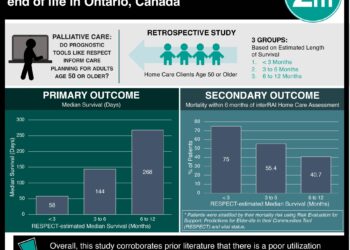Limited knowledge, high interest in pediatric advanced directives among caregivers
1. Half (49.2%) of parents and caregivers of chronically ill children had interest in creating advanced directives (ADs) for their children, while only 3% reported having created an AD for their child.
2. Prior knowledge of ADs was significantly more likely among caregivers with a college degree and significantly less likely among those whose primary language was Spanish.
Evidence Rating Level: 2 (Good)
Study Rundown: Compared to the expansive research on adult palliative care, there is a dearth of studies exploring pediatric palliative care. Despite the increasing proportion of chronically ill children in the US, little is known about the caregivers’ understanding of advanced directives (ADs). This study explored caregivers’ perception of and experience with ADs for their chronically ill children. Close-ended, verbal surveys were administered to caregivers and parents of chronically ill children to ascertain whether they had heard of ADs and if they had any interest in making one for their child. Although 61.6% of participants had never heard of ADs, 49.2% had interest in creating one for their child, indicating a gap between understanding and need. Those with a college education and those speaking English, compared to Spanish, were significantly more likely to know about ADs prior to the administration of the survey. Although this study is one of the few exploring the current state of pediatric ADs, it is limited by the potential selection bias due to the non-randomized nature of sample.
Click to read the study, published today in Pediatrics
Relevant Reading: Pediatric advance care planning: a systematic review
Study Author, Dr. Danica Liberman, MD, MPH, talks to 2 Minute Medicine: Children’s Hospital Los Angeles, Division of Emergency and Transport Medicine, and Keck School of Medicine of the University of Southern California, Department of Pediatrics. Los Angeles, CA.
“As the number of chronically ill children grows in the U.S., familiarity and comfort with end-of-life discussions and advance directives will become increasingly important for physicians. Although pediatric palliative care is gaining interest within the medical community, knowledge about advance directives remains limited among caregivers of children with chronic illness. However, interest in creating advance directives is high, suggesting an unmet need and opportunity for healthcare providers to improve the care of children with chronic illness.”
In-Depth [prospective, cross-sectional survey]: Convenience sampling was used to recruit 307 primary caregivers (participants) of chronically ill patients from the Children’s Hospital of Los Angeles pulmonary and pediatric clinics and emergency department between May 2012 and February 2013. Seventy-two percent of caregivers identified as Hispanic and 55% were born outside of the United States. Mean age of pediatric patients was 8.95 years (SD = 5.99, range .33-19). A close-ended survey was administered to all participants. Sixty-two percent of subjects had not heard about ADs, 81.8% had never discussed them previously, and 49.2% of subjects were interested in creating ADs for their child. Only 3% of subjects already had an AD for their child. Caregivers with a college degree were significantly more likely to know about ADs compared to those without a high school diploma (OR = 4.66, P < .001). Spanish speaking caregivers were significantly less likely to know about ADs, compared to English speakers (OR = .42, P < .01). Finally, caregivers of children who had 11 to 20 emergency room visits in the past year were significantly more interested in creating an AD compared to those who had between 1 and 5 visits (OR = 11.75, P < .02).
More from this author: Virtual visits linked to decreased stress in hospitalized children, Early-onset basal cell carcinoma linked to indoor tanning, Caffeine affects teen boys, girls differently, Rotavirus vaccination associated with decreased rates of health care utilization, Childhood sexual abuse associated with later suicide attempts
Image: PD
©2012-2014 2minutemedicine.com. All rights reserved. No works may be reproduced without expressed written consent from 2minutemedicine.com. Disclaimer: We present factual information directly from peer reviewed medical journals. No post should be construed as medical advice and is not intended as such by the authors, editors, staff or by 2minutemedicine.com. PLEASE SEE A HEALTHCARE PROVIDER IN YOUR AREA IF YOU SEEK MEDICAL ADVICE OF ANY SORT.







